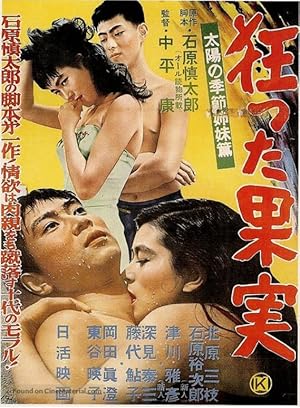Crazed Fruit
| 1956Directed by: Kô Nakahira
Main Plot
Crazed Fruit follows the lives of two brothers, Natsuhiko and Natsuhiko, who are navigating the complexities of youth and desire in post-war Japan. Set against the backdrop of a summer vacation, the brothers become infatuated with a group of young women they encounter at a beach resort. As they indulge in a hedonistic lifestyle filled with parties and carefree moments, their relationships with the women deepen, leading to emotional entanglements and rivalries. The film explores themes of love, jealousy, and the fleeting nature of youth, capturing the vibrant yet tumultuous spirit of the era. As the brothers grapple with their feelings and the consequences of their actions, the story unfolds to reveal the challenges of growing up and the impact of their choices on their lives and relationships.
Characters
- Yûjirô Ishihara plays Natsuhisa, a rebellious youth entangled in a love triangle, driving the film's exploration of post-war Japanese disillusionment and youthful recklessness.
- Masahiko Tsugawa plays Haruji, a naive younger brother entangled in a love triangle, highlighting youthful recklessness and the complexities of desire and betrayal.
- Mie Kitahara plays Eri, a complex love interest whose relationships with two brothers drive the story's tension and themes of youthful rebellion and disillusionment.
Ending Explained
In Crazed Fruit, the ending encapsulates the tumultuous emotions and conflicts that have driven the narrative. The film concludes with the protagonist, who has been caught in a web of desire and rivalry, facing the consequences of his actions. After a series of intense encounters and emotional upheavals, the protagonist's relationship with his brother and the object of their affections reaches a breaking point. As tensions escalate, the protagonist grapples with feelings of jealousy and betrayal, leading to a confrontation that ultimately forces him to confront his own desires and the impact they have on those around him. The climax reveals the fragility of their relationships, highlighting the destructive nature of obsession and the inevitability of change. In the final moments, the protagonist is left to reflect on the choices he has made, symbolizing a loss of innocence and the harsh realities of adult relationships. The film closes on an ambiguous note, suggesting that while some conflicts may resolve, the emotional scars and complexities of love and rivalry linger on. This ending reinforces the film's themes of youth, passion, and the bittersweet nature of growing up, leaving viewers with a sense of unresolved tension and contemplation.
